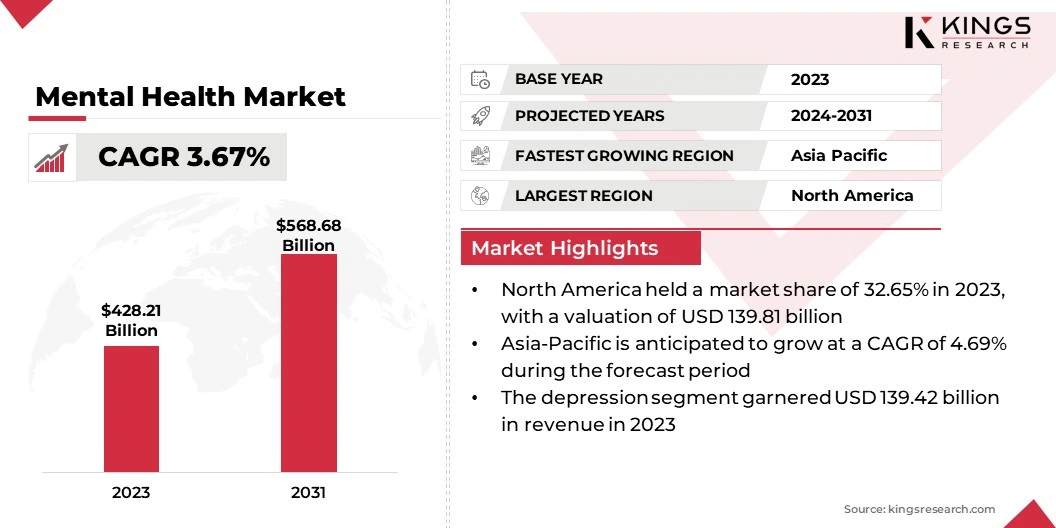Healthcare Medical Devices Biotechnology

Mental Health Market

Mental Health Market Size, Share, Growth & Industry Analysis, By Disorder Type (Depression, Bipolar Disorder, Schizophrenia, Anxiety, Post-Traumatic Stress Disorder, and Other Mental Disorders), By Age Group (Pediatric, Adult, and Geriatric), and Regional Analysis, 2024-2031
Pages : 120
Base Year : 2023
Release : July 2024
Report ID: KR856
Mental Health Market Size
The global Mental Health Market size was valued at USD 428.21 billion in 2023 and is projected to grow from USD 441.91 billion in 2024 to USD 568.68 billion by 2031, exhibiting a CAGR of 3.67% during the forecast period. The market is expanding globally, driven by increasing awareness, the rising prevalence of mental health disorders, and advancements in treatment options including digital health solutions.
Moreover, key factors such as regulatory developments, technological innovations, and efforts to reduce stigma are influencing market growth and accessibility of mental health services. In the scope of work, the report includes solutions offered by companies such as Behavioral Health Network, Inc., Acadia Healthcare, CareTech Holdings PLC, Sevita, Universal Health Services, Inc., Unison Health, Kennebec Behavioral Health, Vita Health Group, Claimont, Promises Behavioral Health, and others.
The global mental health market is experiencing significant growth driven by heightened awareness and increasing prevalence of mental health disorders worldwide. Advances in digital health solutions are enhancing accessibility to care, while regulatory developments and stigma reduction efforts are fostering a supportive environment for market expansion. Key players are innovating with new treatment modalities and telehealth options to meet diverse patient needs. Furthermore, the market is influenced by demographic shifts and healthcare policies aimed at integrating mental health services into broader healthcare systems.
Mental health refers to a person's emotional, psychological, and social well-being, encompassing how individuals think, feel, and behave. It influences how individuals handle stress, relate to others, and make choices in daily life.
Good mental health supports resilience, productivity, and overall quality of life, while mental health disorders can affect mood, behavior, and cognitive function, leading to challenges in functioning and coping with life's demands. Mental health is essential for individuals to realize their potential, cope with the stresses of life, work productively, and contribute to their communities.
Analyst’s Review
The growth of the market is fueled by increasing awareness and government initiatives aimed at expanding services. Leading players are leveraging technological advancements, such as telehealth platforms and digital therapeutics, to enhance the accessibility and delivery of mental health care. These innovations cater to growing demand and mitigate barriers such as stigma and geographical constraints.
- For instance, the United States' recently allocated USD 31.5 million to behavioral health grants. This initiative underscores a strategic effort to address the nation's mental health crisis among children, youth, and young adults. Such initiatives are pivotal in propelling market development and improving overall mental health outcomes.
Mental Health Market Growth Factors
The primary factors supporting market growth include the increasing prevalence of mental disorders, a rising geriatric population, and increased mental health awareness through campaigns. Mental illnesses encompass a spectrum of conditions varying in severity from mild to severe disruptions in thinking, emotional regulation, or behavior.
- According to a June 2022 WHO report, approximately 1 in every 8 individuals worldwide lives with a significant mental disorder.
- Mental Health Foundation's 2022-23 report noted high anxiety levels among 37.1% of women and 29.9% of men in the United Kingdom.
These figures highlight the substantial global and regional burden of mental disorders, which is expected to significantly impact the market.
The mental health market is expected to face challenges due to the enduring stigma associated with mental health issues and the high cost of therapy. Stigma often prevents individuals from seeking help, leading to delayed treatment and exacerbation of mental health conditions. Moreover, the expense associated with therapy and mental health services present barrier for many, limiting access to essential care.
However, key players are actively involved in public education campaigns to destigmatize mental health issues, promoting open dialogue and awareness. Additionally, numerous providers are adopting innovative pricing models and expanding insurance coverage options to make therapy more affordable for patients.
Telehealth platforms are playing a crucial role by increasing access to mental health services remotely, circumventing geographic barriers, and offering convenient care options, contributing significantly to market growth.
Mental Health Market Trends
A significant trend fueling market progress is the increasing awareness of mental health through impactful campaigns that promote public engagement and utilization of mental health services.
- In May 2023, the National Alliance on Mental Illness (NAMI) in the U.S. launched the MoreThanEnough campaign during Mental Health Awareness Month.
This initiative aimed to address pressing mental health needs and foster a sense of community for individuals that experience ongoing crises, thereby facilitating access to necessary treatments and services. Such campaigns are expected to contribute to sustained market growth by prompting an increasing number of people to seek mental health support and enhancing overall mental health care utilization.
The widespread adoption of telehealth and digital mental health solutions represents a transformative trend in the mental health sector, significantly enhancing accessibility and convenience of care. These technologies enable individuals to access mental health services remotely, addressing traditional barriers such as geographical distance and transportation challenges.
Furthermore, telehealth platforms allow mental health providers to expand their reach and serve a broader patient base efficiently. They further reduce overhead costs associated with physical facilities and streamline appointment scheduling and patient management processes. As the demand for convenient healthcare solutions grows, telehealth and digital platforms are poised to foster innovation and improve patient outcomes in the mental health market.
Segmentation Analysis
The global market is segmented based on mental health disorder type, age group, services, and geography.
By Mental Health Disorder Type
Based on mental health disorder type, the mental health market is categorized into depression, bipolar disorder, schizophrenia, anxiety, post-traumatic stress disorder (PTSD), and other mental disorders. The depression segment garnered the highest revenue of USD 139.42 billion in 2023.
This growth is primarily stimulated by several factors, including the significant burden of depression cases, increasing awareness regarding depression management through educational programs, and the introduction of advanced services.
- According to a March 2023 report from the WHO, depression affects an estimated 3.8% of the global population, with a higher prevalence among adults, particularly women and older adults.
This underscores a strong demand for effective psychological treatments such as behavioral activation, cognitive behavioral therapy, interpersonal psychotherapy, and problem-solving therapy, which is likely to augment segmental expansion in the foreseeable future.
By Age Group
Based on age group, the market is divided into pediatric, adult, and geriatric. The adult segment captured the largest mental health market share of 58.67% in 2023. The increasing prevalence of mental health disorders among adults worldwide is expanding the patient base.
The increased awareness and advocacy efforts are reducing stigma, leading to an increasing number of adults seeking treatment. The rising advancements in treatment modalities, including personalized therapies and digital health solutions, are enhancing both efficacy and accessibility. These factors are contributing significantly to a robust growth trajectory of the segment.
By Services
Based on services, the market is categorized into inpatient treatment services, outpatient treatment services, emergency mental health services, and other mental health services. The inpatient treatment services segment is projected to generate the highest revenue of USD 234.14 billion by 2031.
This notable expansion is facilitated by the critical need for intensive care among individuals with acute psychiatric conditions. Inpatient treatment provides essential services that cannot be adequately addressed through outpatient or community-based settings alone, thereby expanding the scope of mental health care accessibility.
The increasing demand for specialized treatment facilities, coupled with advancements in therapeutic approaches and patient-centric care models, supports the expansion of the segment. Moreover, strategic investments in infrastructure development, technology integration, and workforce training enhance service capabilities and patient outcomes, thereby contributing to the development of the segment.
Mental Health Market Regional Analysis
Based on region, the global market is classified into North America, Europe, Asia-Pacific, MEA, and Latin America.

North America mental health market share stood around 32.65% in 2023 in the global market, with a valuation of USD 139.81 billion. The North America market is characterized by robust infrastructure, advanced treatment modalities, and evolving regulatory frameworks. Rising awareness and acceptance of mental health issues lead to increased demand for a wide range of services, including psychotherapy, medication management, and innovative digital health solutions.
The regional market benefits from well-established healthcare systems with integrated mental health services, contributing to accessible care for a diverse population. Technological advancements in telehealth and mobile applications further enhance service delivery and patient engagement, thereby supporting regional market expansion.
Asia-Pacific is anticipated to witness the highest growth at a CAGR of 4.69% over the forecast period. High prevalence rates of mental health disorders in the region, coupled with rapid urbanization and demographic changes, result in a significant demand for accessible and effective treatment solutions.
Furthermore, advancements in telehealth and digital health technologies are enhancing accessibility, particularly in remote areas. Regulatory frameworks and healthcare infrastructure development play a crucial role in shaping service delivery and fostering regional market expansion opportunities.
Competitive Landscape
The mental health market report will provide valuable insight with an emphasis on the fragmented nature of the industry. Prominent players are focusing on several key business strategies such as partnerships, mergers and acquisitions, product innovations, and joint ventures to expand their product portfolio and increase their market shares across different regions.
Companies are implementing impactful strategic initiatives, such as expanding services, investing in research and development (R&D), establishing new service delivery centers, and optimizing their service delivery processes, which are likely to create new opportunities for market growth.
List of Key Companies in Mental Health Market
- Behavioral Health Network, Inc.
- Acadia Healthcare
- CareTech Holdings PLC
- Sevita
- Universal Health Services, Inc
- Unison Health
- Kennebec Behavioral Health
- Vita Health Group
- Claimont
- Promises Behavioral Health
Key Industry Development
- June 2023 (Acquisition): Comvest Partners, announced the acquisition of Your Behavioral Health, a behavioral health services platform based in Torrance, California. This acquisition marks the 13th healthcare services platform investment by Comvest’s private equity strategy. The addition of Your Behavioral Health to Comvest's portfolio highlights the firm's commitment to expanding its presence in the market, providing enhanced resources and support for behavioral health services.
The global mental health market is segmented as:
By Mental Health Disorder Type
- Depression
- Bipolar Disorder
- Schizophrenia
- Anxiety
- Post-Traumatic Stress Disorder (PTSD)
- Other Mental Disorders
By Age Group
- Pediatric
- Adult
- Geriatric
By Services
- Inpatient Treatment Services
- Outpatient Treatment Services
- Emergency Mental Health Services
- Other Mental Health Services
By Region
- North America
- U.S.
- Canada
- Mexico
- Europe
- France
- U.K.
- Spain
- Germany
- Italy
- Russia
- Rest of Europe
- Asia-Pacific
- China
- Japan
- India
- South Korea
- Rest of Asia-Pacific
- Middle East & Africa
- GCC
- North Africa
- South Africa
- Rest of Middle East & Africa
- Latin America
- Brazil
- Argentina
- Rest of Latin America
CHOOSE LICENCE TYPE
Frequently Asked Questions (FAQ's)
Get the latest!
Get actionable strategies to empower your business and market domination
- Deliver Revenue Impact
- Demand Supply Patterns
- Market Estimation
- Real-Time Insights
- Market Intelligence
- Lucrative Growth Opportunities
- Micro & Macro Economic Factors
- Futuristic Market Solutions
- Revenue-Driven Results
- Innovative Thought Leadership

